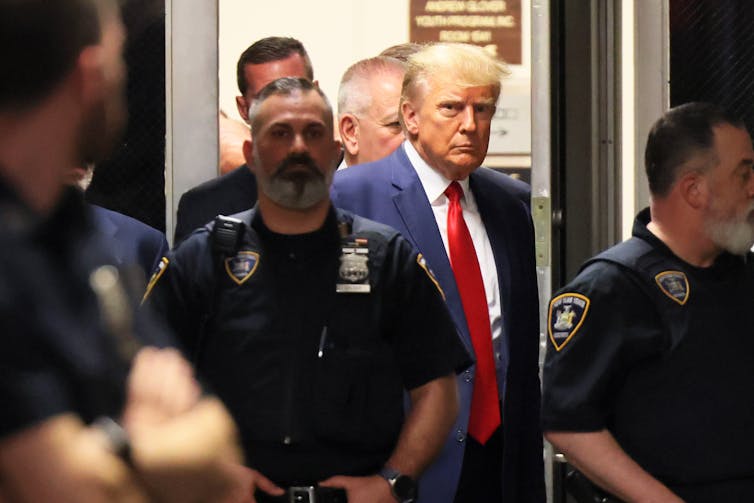Prosecuting a former president is not an easy decision. A criminal law professor explains why

[ad_1]
The issue of indicting a former US president is a difficult one.
However, the state’s attorney general accused Donald Trump of violating the law New York Business Laws. A federal prosecutor accused Trump of violations National security laws also.
On the one hand, the American judicial system rests on a fundamental principle of English law that dates back to the early twelfth century, that no one is above the law. As a jurist in the Middle Ages Henry de Bracton As explained in The Laws and Customs of England, it is the law that makes the king, and therefore, the king must be subject to the law.
De Bracton wrote: “The king should not be under anyone, but under God and the law.”
In his brief public statement, Special Counsel Jack Smith restated that notion when he announced his decision to charge Trump with violations of national security laws as well as participation in a conspiracy to obstruct justice.
“We have one set of laws in this country, and they apply to everyone.” Smith said. “A commitment to the rule of law is a fundamental principle. … Our nation’s commitment to the rule of law sets an example for the world.”
But a strong case can be made for the attorney general to exercise discretion and not charge a former president.
Part of this argument is based on the perception that such a decision might arise among some of the American public, which is that the criminal justice system has been weaponized to punish political competitors.
Indeed, Trump, as well as some of his supporters, have used this perception to try to convince his political base that both charges are politically motivated. Even one of Trump’s congressional supporters, Jim Jordan, an Ohio Republican, has done so Holding hearings on armaments to the FBI, among other federal agencies.
House Speaker Kevin McCarthy spoke for many of Trump’s supporters when he said this Fox News Digital“This is going to disrupt this nation because it goes to the very essence of equal justice for all, which we are not witnessing today. And we will not stand in the way of that.”
It is reasonable for ordinary citizens to fear that prosecutors will abuse their power by bringing unjustified and politically motivated charges against their political opponents. Some basic legal principles can shed light on when such prosecutions are reasonable or unreasonable.
When I teach first-year criminal law at Harvard University, one of my goals is to help the class understand that criminal law is based on what societies consider morally wrong behavior.
In the state case as well as the federal case, both plaintiffs believe Trump’s behavior crossed that threshold.
The judicial system needs credibility
When considering charging a former president with crimes, two extreme positions must be rejected from the outset.
First, some argue that equality under the law means just that. If a former president committed a crime, he should be charged.
This position ignores the fact that the costs associated with impeaching a former president – especially the current presidential candidate – could be high.
Our criminal justice system rests on citizens’ belief in its legality. The widespread belief that the prosecution of a former president is being used as a political tool undermines this legitimacy.

Peter DeJonge/AFP via Getty Images
Second, others like McCarthy argue that the former president should not be charged with any crime, because to do so would permanently damage the credibility of the American democratic tradition.
This argument overestimates the potential consequences, too.
In recent years, two democracies, France and Israel, have indicted a former or current leader, and both those democracies still working.
in France, Former President Nicolas Sarkozy He was charged and convicted in 2021 on corruption charges. And in Israel the prime minister sits Benjamin Netanyahu He was accused of bribery, among other charges.
Like France and Israel, the democratic traditions in the United States are strong enough to withstand the impeachment of a former president or presidential candidate.
When is a former president charged?
Legal theorists have divided criminal law into two categories.
Known in Latin as “Malom in itselfThe first category is used to define behavior that is inherently evil as determined by the sense of a civilized society.
This behavior includes murder, theft and assault.

Kina Betancourt/Getty Images
The other category is known in Latin as “Malom is bannedIt involves conduct that is considered an offense only because the law so provides.
In plain terms, malum in and of itself is illegal because the behavior is, on the face of it, immoral.
In contrast, a proscribed malum is immoral only because the law considers it illegal.
For example, premeditated murder is immoral on the face of it.
Failing to be careful at a yellow light is not in itself immoral; It’s wrong because lawmakers wrote a blog saying it’s wrong.
What kind of crime?
Prosecutors should only charge former presidents or presidential candidates with crimes they believe are immoral.
In this way, an entire category of non-serious offenses is excluded from consideration. For example, a Democratic attorney general in the United States would never be able to charge a former Republican president with an offense. Likewise, a Republican attorney general will not accuse a Democratic presidential candidate of littering.
While the exclusion of many offenses by the Public Prosecution Service is a useful start in determining whether or not to prosecute offenses, the difficult analytical work comes when determining which categories certain offenses fall into.

Michael M. Santiago/Getty Images
Is it evil to violate state business registry laws?
Is it immoral to violate national security laws?
Is it more like a traffic violation or premeditated murder?
What if the former president violated the commercial registry laws for the purpose of violating another law, which raises the behavior from a misdemeanor to a felony?
And in his public remarks shortly after Trump was impeached, Manhattan District Attorney Alvin Bragg He explained that New York is the financial capital of the world and that the state has a huge interest in enforcing its business records laws.
Bragg further explained that failure to observe business registry laws can have an impact on consumers – the real, ordinary people who rely on fair business practices, which in turn are the basis for fair markets, fair interest rates and fair prices for a range of goods and services.
Nobody is above the law
In the end, the decision to bring criminal charges against a former president turns out to be a difficult question.
Equal protection under the law It is a value that Americans should cherish. But when it comes to a former president, competing values must be kept in mind.
Is the alleged crime so egregious that the benefits of equal accountability before the law would outweigh the cost associated with the appearance of an armed partisan trial?
To date, Smith and Bragg are the only state and federal prosecutors to have answered that question by seeking an indictment.
“Today we uphold our solemn responsibility to ensure that everyone is equal before the law,” Bragg said. “There is no amount of money…and power changes this permanent American principle.”
Likewise, Jack Smith urged those interested in the case to read the indictment before making accusations that his investigation was politically motivated.
“Our laws protecting national defense information are essential to the safety and security of the United States, and must be enforced,” he added. Smith said. “Violations of these laws put our country at risk.”
This article has been corrected to reflect the position espoused by Benjamin Netanyahu.
[ad_2]
Source link





